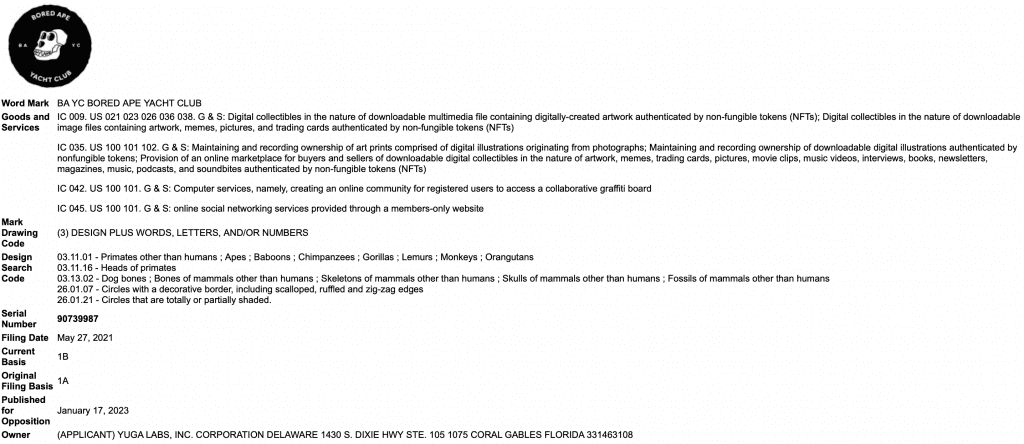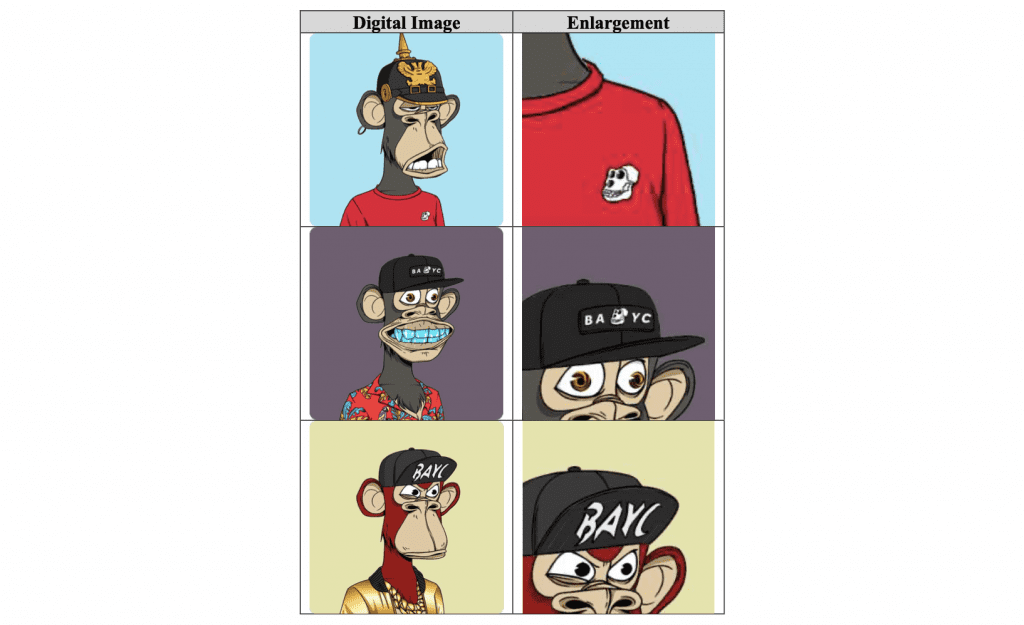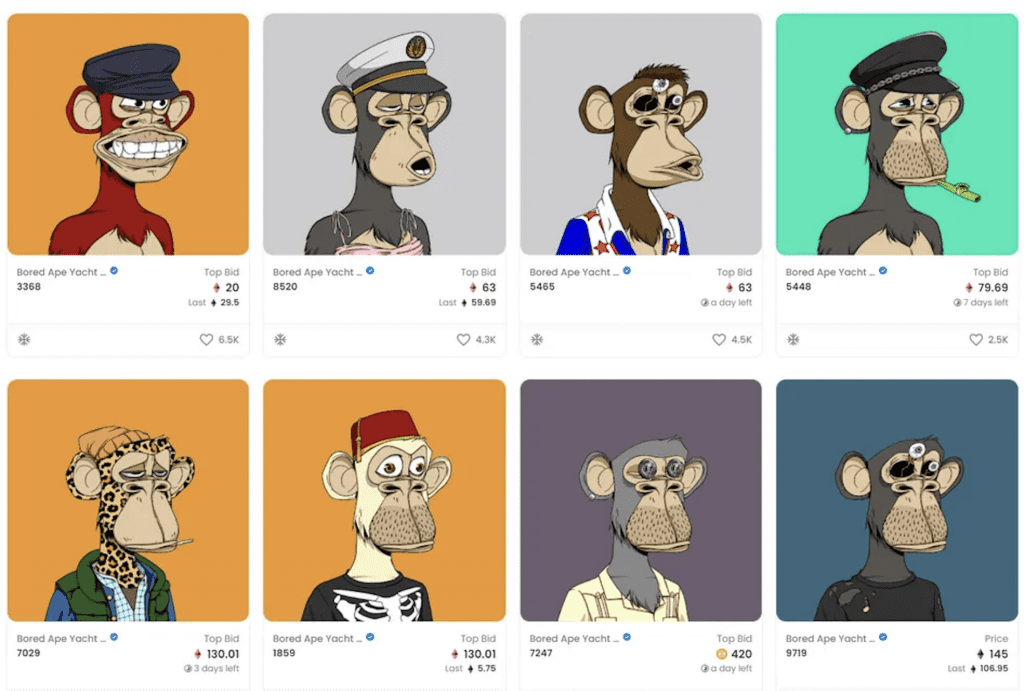In the midst of the trademark lawsuit waged against him and partner Ryder Ripps by Yuga Labs over their “parodic NFT-based” RR/BAYC project, Jeremy Cahen has filed two oppositions over a dozen trademark applications for registration lodged by the company behind the Bored Ape Yacht Club (“BAYC”). After first teasing potential oppositions late last year when he sought extensions to oppose a number of BAYC-centric applications in December 2022 (and again early this year), Cahen initiated opposition proceedings on February 3 and Feb. 9, in which he is looking to block the registration of twelve of Yuga Labs’ BAYC marks – from its skull logo to its Bored Ape, Bored Ape Yacht Club, and BAYC word marks.
Setting the stage in the newly initiated opposition proceedings, Cahen asserts that he believes that he will be damaged by the registration of the BAYC marks at issue, which Yuga Labs is using in connection with “downloadable image files containing artwork, memes, pictures, and trading cards authenticated by NFT” (in Class 9); “maintaining and recording ownership of downloadable digital illustrations authenticated by NFT” (in Class 35); and “authentication and validation of data in the field of financial and digital transactions authenticated by NFTs using blockchain technology” (in Class 42), among other things.
In terms of his bases for opposition, in the Feb. 9 opposition, Cahen argues that all ten of Yuga Labs’ applications should be blocked due to …
(1) Lack of a bona fide intent to use – According to Cahen, Yuga Labs did not have a bona fide intent to use the “alleged marks … on or in connection with any of the applicable opposed goods as of the filing date” of its applications, and thus, the applications “are invalid as a whole or at least with respect to those goods and services for which applicant lacked such bona fide intent.”
(2) Lack of a bona fide intent to lawfully use – More interestingly, Cahen follows up on the previous basis by arguing that Yuga Labs “did not have a bona fide intent to lawfully use the alleged mark[s]” because of the nature of the BAYC NFTs. Specifically, Cahen claims that the BAYC NFTs “constitute securities as defined under federal securities laws,” and by offering up and selling the NFTs without registering with the Securities and Exchange Commission, Yuga Labs violated Section 5 of the Securities Act.

(3) Failure to police third-party use – Cahen further asserts that all of the applications should be blocked due to Yuga Labs’ alleged failure to police unauthorized uses of the marks, thereby, “abandon[ing] any rights it may have had” in those marks. In particular, Cahen argues that Yuga Labs’ failure to police others’ uses of the BAYC marks constitutes “a course of conduct that has made it impossible for the alleged marks to function as an indication of source” (i.e., as a trademark) given that “many third parties offer goods and services using marks that comprise or contain the alleged marks, including goods and services offered by relevant NFT purchasers.” (This appears to be a nod to the naked licensing claim that Ryder Ripps and Cahen asserted late last year in their counterclaims in response to Yuga Labs’ lawsuit.)
Turning to the “Ape Skull Design” logos, Cahen claims that these marks should not be registered because: (1) Yuga Labs “does not own the skull design as a result of a conveyance to ApeCoin DAO,” a donation that “did not involve any transfer of goodwill” and that “contain[ed] no reservation of rights in favor of [Yuga Labs], and in particular, no reservation of trademark rights”; and (2) Yuga Labs abandoned any rights it may have had in the Skull Design “due to a course of conduct that has made it impossible for the Skull Design to function as an indication of source, namely, by conveying to the ApeCoin DAO unrestricted rights to use the [logo].”
For the “Bored Ape Yacht Club” applications, Cahen advances two key claims: (1) The BAYC mark “was not intended to be and is not a trademark, but is instead intended to be the title of a single creative work, which is not entitled to registration for that reason;” and (2) Even if it was intended to be a trademark, these marks should not be registered because “the term ‘ape’ is inherently generic as applied to goods and services featuring images or animations of apes; has become generic as applied to such goods and services because consumers have come to understand the designation “ape” to refer to a category of digital artworks and related goods and services featuring images of apes; or is at a minimum merely descriptive as applied to goods and services that include, relate to, or rely upon NFTs or goods and services that feature images or animations of apes.”

As for the “Digital Image Design” applications (i.e., those for the Ape Skull Design, the BA YC and skull design, and the BAYC word mark), Cahen asserts that registrations should not be issued because …
(1) Yuga Labs is “not the rightful owner of the alleged marks because it conveyed them to purchasers” of certain BAYC NFTs, namely, BAYC NFTs that contained those marks in the bored ape images. For instance, Cahen claims that Yuga Labs “sold at least 355 BAYC NFTs linking to digital images that include the Skull Design,” and that the company’s terms “contain no reservation of trademark rights in favor of [Yuga Labs],” and instead, the terms convey “all rights in the Digital Images to BAYC NFT purchasers, including all rights in the Design Image Designs as they appear in the digital images corresponding to the relevant NFTs; and
(2) In the alternative, Cahen contends that Yuga Labs abandoned any rights it may have had in the Digital Image Designs “due to a course of conduct that has made it impossible for them to function as an indication of source, namely, by conveying or licensing rights in the Digital Image Designs to relevant NFT purchasers.” With such licensing in mind, he maintains that Yuga Labs “has no right to control the type or quality of goods or services that relevant NFT purchasers may offer using derivative works based upon the Digital Images, including works comprising the design portion of the Digital Image Designs.”
In a separate opposition centering on two Yuga Labs-filed applications for the BORED APE for use in Classes 9, 35, and 42, Cahen similarly argues that marks should not be registered in light of Yuga Lab’s alleged lack of intent to use the marks and the allegedly generic nature of the marks. Among other things, Cahen claims that “by claiming exclusive rights in the designation ‘bored ape,’” Yuga Labs is looking to prevent him and others “from using the designation, which is necessary to accurately describe their goods and services featuring images and animations of bored apes.
The oppositions come after Yuga Labs filed suit against Ripps and Cahen in June 2022, in which it accuses the, of trademark infringement, false designation of origin, cybersquatting, and conversion (not defamation), on the basis that by way of their RR/BAYC project, they created and sold NFTs bearing “the very same trademarks that Yuga Labs uses to promote and sell authentic BAYC NFTs.” Ripps and Cahen have since lodged counterclaims against Yuga Labs, accusing the company of “knowingly and materially misrepresent[ing]” its rights in the BAYC NFTs, while engaging in an “outrageous retaliatory campaign” against them, including by “lying about” – and “intimidating and threatening” – them.











